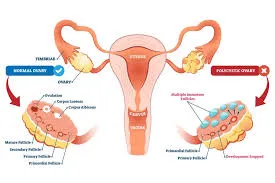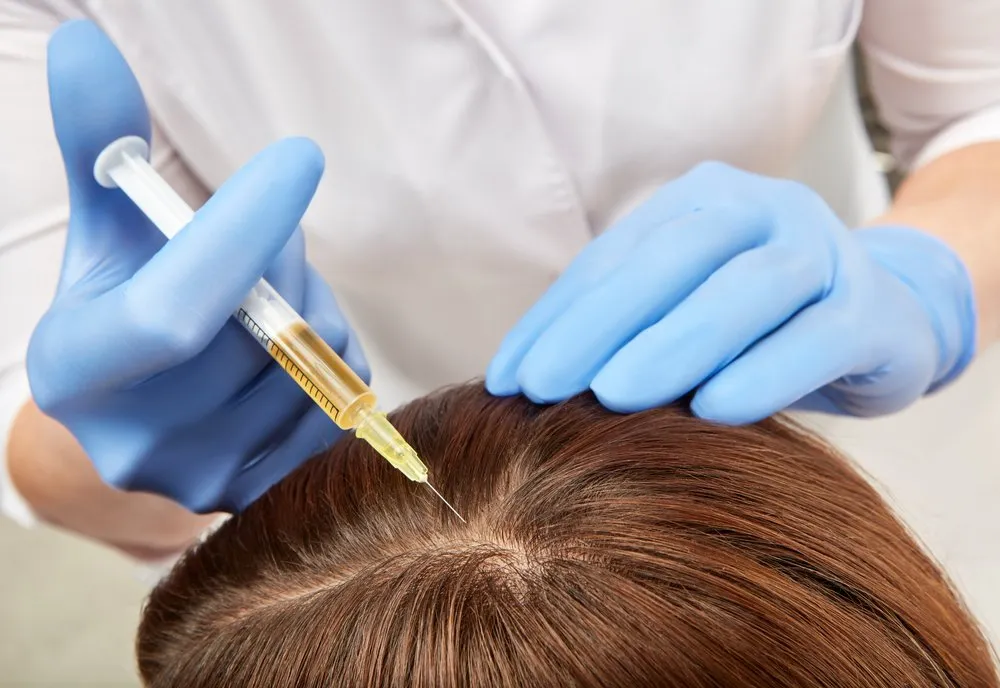If you’re struggling with thinning hair caused by PCOS, you’re not alone. Many women search for how to reverse PCOS hair loss naturally without depending entirely on medications.
This article explores science-backed strategies—from dietary changes to herbal remedies—to help restore your hair. You’ll also learn lifestyle tips, expert advice, and realistic regrowth timelines. By the end, you’ll feel empowered with natural, safe, and effective ways to manage PCOS-related hair loss.
Understanding PCOS Hair Loss

What is PCOS, and How Does It Affect Hair?
Polycystic Ovary Syndrome (PCOS) is a hormonal disorder that affects 1 in 10 women of reproductive age. One of its hallmark symptoms is an excess of androgens (male hormones), which can trigger female pattern hair loss, typically seen as thinning at the crown or widening part.
The Role of Androgens in Female Pattern Hair Loss
Elevated androgens shrink hair follicles, shorten the hair growth cycle, and make strands thinner and weaker. This process—called miniaturization—can slow hair growth and eventually cause noticeable hair thinning.
Symptoms of PCOS-Related Hair Thinning
- Hair shedding, especially at the crown or temples
- Slow regrowth
- Excess facial or body hair (hirsutism)
- Oily scalp or acne (due to hormonal imbalance)
Can PCOS Hair Loss Be Reversed Naturally?
What “Reversal” Really Means
“Reversing” PCOS hair loss naturally doesn’t mean restoring hair overnight. It involves slowing hair shedding, stimulating regrowth, and balancing hormones to prevent future loss.
Why a Holistic Approach Is Essential
PCOS is a systemic condition—it affects hormones, metabolism, and inflammation. Natural hair regrowth requires lifestyle changes that target the root causes: diet, stress, insulin resistance, and inflammation.
Natural Ways to Reverse PCOS Hair Loss
Anti-Inflammatory Diet Changes
What you eat can make or break your hair’s health. Focus on:
- Low glycemic index foods (e.g., leafy greens, quinoa, berries) to reduce insulin spikes
- Omega-3 fatty acids (found in flaxseeds, walnuts, and fish) to fight inflammation
- Protein-rich meals to support keratin production
Pro Tip: Avoid dairy and refined sugars, which may worsen androgen levels and trigger hair shedding.
Herbal Supplements and Natural Remedies
Certain herbs can naturally reduce androgens and support regrowth:
- Spearmint Tea: Known to reduce testosterone levels
- Saw Palmetto: Blocks DHT, a hormone linked to hair follicle shrinkage
- Inositol (Myo- & D-Chiro): Improves insulin sensitivity and hormone balance
Scalp Massage and Natural Oils
Boost circulation and follicle health with regular scalp massages using:
- Rosemary oil: A natural DHT blocker and growth stimulant
- Castor oil: Rich in ricinoleic acid, which supports scalp health
- Coconut oil: Nourishes and protects hair strands
Stress Management Techniques
Chronic stress increases cortisol, which worsens hormonal imbalances. Natural ways to lower stress include:
- Mindfulness and meditation
- Gentle yoga
- Deep breathing exercises
Improving Sleep Hygiene
Poor sleep disrupts hormone production. Improve your sleep by:
- Keeping a regular bedtime
- Avoiding screens before bed
- Creating a calming bedtime routine
Realistic Timelines for Regrowth
Natural regrowth isn’t instant. Expect:
- 1–2 months: Reduced shedding
- 3–4 months: Visible regrowth
- 6+ months: Fuller, healthier hair
When to Seek Professional Help
If hair loss worsens despite natural methods, consult a specialist. You may need blood work to check androgen, insulin, and thyroid levels.
Lifestyle Habits That Support Hair Regrowth
Importance of Regular Exercise
- Boosts insulin sensitivity
- Regulates cortisol and estrogen levels
- Improves blood flow to the scalp
Try moderate activities like walking, swimming, or Pilates for 30 minutes, 4–5 days a week.
Avoiding Harsh Hair Care Products
- Skip sulfates, parabens, and alcohol-based products
- Choose gentle, sulfate-free shampoos
- Avoid daily washing if the hair is dry
Limiting Heat Styling and Chemical Treatments
- Let your hair air dry
- Use heat protectants
- Avoid frequent bleaching, straightening, or perming
Before and After Progress Timelines
Most women see improvements in stages:
- Months 1–2: Less shedding
- Months 3–4: Baby hairs along hairline
- Months 5–6: Thicker density and better volume
When Natural Methods May Not Be Enough
Signs You Need Medical Treatment
- No regrowth after 6 months
- Hair loss continues to worsen
- Signs of other hormonal conditions (e.g., thyroid issues)
Integrating Natural and Medical Approaches
You can combine natural treatments with:
In-clinic procedures like PRP therapy
Prescription anti-androgens
Topical treatments like minoxidil

Frequently Asked Questions (FAQs)
Q1: How long does it take to reverse PCOS hair loss naturally?
On average, it takes 3–6 months to see visible improvement, depending on consistency and severity of hair loss.
Q2: Can hair regrow without taking medication like minoxidil?
Yes, many women have achieved regrowth using dietary changes, herbal supplements, and scalp care alone. However, results vary.
Q3: Is PCOS hair loss permanent if untreated?
If left unmanaged, PCOS-related hair loss may progress and become harder to reverse. Early intervention is key.
Q4: Are natural remedies safe for everyone?
Most are safe, but always consult your doctor, especially if you’re pregnant, breastfeeding, or on medications.
Q5: Should I stop birth control to reverse hair loss naturally?
Not necessarily. Birth control helps regulate hormones, but it’s best to discuss with your gynecologist before making changes.
Take Your Next Step
If you’re unsure where to start or aren’t seeing results, book a consultation with Dr. Rana Irfan in Islamabad. Our clinic offers:
- Personalized hair regrowth plans
- Natural and medical treatment options
- Female-friendly consultations in a confidential setting
Take control of your hair and hormones—naturally.
